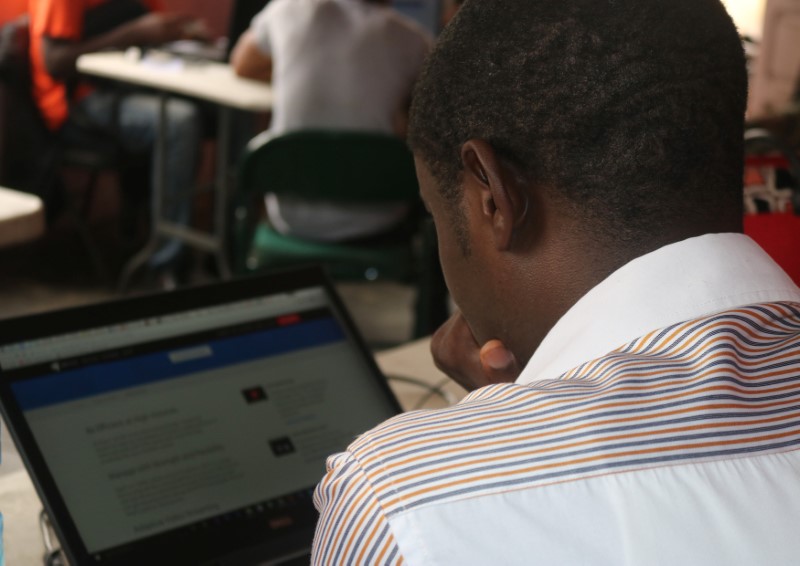By Edward McAllister
DAKAR (Reuters) - Rapidly expanding access to the internet across Africa is helping grassroots opposition movements take on once-invulnerable regimes. Many entrenched rulers have a simple response: pulling the plug.
While countries in the Middle East and China employ firewalls and block virtual private networks to control web access, leaders in Africa increasingly prefer the blunter instrument of outright outages.
Critics say that infringes not just the rights of individuals but also undermines the burgeoning economies of some of the world's poorest countries.
Since the start of 2016, governments in 13 African nations have intentionally shut down the internet on 21 occasions, mainly during elections and protests, according to a database run by online rights group Access Now. That compares to seven shutdowns in the previous two years.
Earlier this month, tech entrepreneur Sama Tanya saw Cameroonian police fire teargas into a residential building during protests by the country's English-speaking minority.
As choking women and children poured onto the street, he considered documenting the crackdown to share on social media, only to realize the internet connection had been cut.
"I couldn't even reach my family to tell them. I was worried, but I couldn't share a thing," he said by telephone from the city of Buea, the epicenter of the demonstrations.
Rights group Internet Without Borders says cutting access is a violation of international law and defies a July 2016 U.N. resolution affirming that "the same rights that people have offline must also be protected online."
Internet freedom declined worldwide for the sixth straight year in 2016, according to an annual report from Freedom House.
"Africa is becoming a new testing ground for authoritarian practices online," said Francois Patuel, West Africa researcher at Amnesty International.
"We have seen disruptions in Togo and in other countries but also arrests for what people are saying online. Often what people say online can be used against them in court."
"PROTECT THE POPULATION"
Internet cuts in Africa date back to the 2011 Arab Spring when rulers in Egypt, Tunisia and Libya sought to control the spread of information.
Today, the intent is the same, but the methods have evolved.
Governments slow internet speed by reducing bandwidth, or "throttling", and target and shut down certain URLs like Facebook (NASDAQ:FB), Twitter and WhatsApp, a process known as filtering.
Although free apps like VPN Monster and Turbo VPN can circumvent filtering using VPNs which mask the location of a computer or phone, even a VPN won't help you if you don't have an internet connection in the first place.
When Gabon shut down internet access for several days last year as violent street protests erupted against President Ali Bongo's contested re-election, it likely only required flipping a virtual switch at state-run Gabon Telecom.
Gabon Communications Minister Bilie-By-Nze acknowledged in a Reuters interview that internet access had been disrupted, but declined to comment further.
During elections in Gambia in December, the government ordered the shutdown of the internet's "landing point", the central point from which service is supplied to the whole country, according to two people with knowledge of the decision.
In Togo, authorities appeared to have organized a mobile data shutdown during opposition protests against President Faure Gnassingbe last month, according to people who were there who said fixed internet lines remained available.
"Certain people post images to amplify the situation or publish photos of horror," Togo's Security Minister Colonel Damehame Yark told reporters earlier this month. "The government decided to cut the internet because we have to protect the population."
Democratic Republic of Congo asked telecommunications companies to block social media networks in December. Providers declined to comment at the time on whether they would comply, but one industry executive said all companies had signed an agreement to respect national security injunctions.
"When a sovereign government gives licenses to telecoms companies, those companies have little choice but to comply with the government's demands," said Doug Madory, director of internet analysis at Oracle (NYSE:ORCL) Dyn, which monitors international internet traffic flows.
Orange and Airtel, which provide service in countries where there have been shutdowns, did not respond to requests for comment for this story. MTN, the continent's top mobile phone operator, provided a link to a company statement outlining its dedication to internet freedom but declined to comment further.
BAD FOR BUSINESS
Outages may be aimed at political opponents or social disruptors but businesses crucial to Africa's economic growth can get also caught up in the crackdown.
Sub-Saharan Africa's internet shutdowns have cost the region up to $237 million in economic losses since 2015, according to a recent report by the UK government-funded Collaboration on International ICT Policy for East and Southern Africa.
Shutdowns are "adversely affecting the livelihoods of citizens, undermining the profitability of business enterprises, and reducing the GDP and competitiveness of countries that implement them," the report said.
Etta Ayuk's small tech start-up Skylabase, which provides software to banks, lost three major clients and $20,000 worth of business when the internet was shut down from January to April in Anglophone Cameroon, forcing him to fire nearly half his employees.
During the outage, Ayuk and his remaining staff crammed onto buses every morning for the 70-km (44-mile) drive to Francophone Cameroon's commercial capital, Douala, to use the internet there. Gridlock often made it a three-hour trip each way.
Cameroon's government declined repeated requests for comment.
Ayuk is considering rebasing to Gambia, which has not had a government shutdown since Adama Barrow became president in January 2017. Barrow is encouraging internet start-ups.

"I am a child of Cameroon, I don't want to leave," he said. "But the political situation is not supporting us."